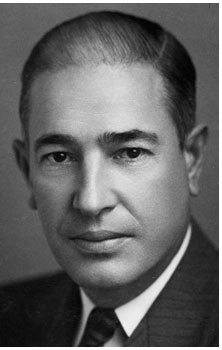
C.C. “Cliff” Rathburn (1895-1985)
Inducted 1979
Highlights
Florida Canners Association
World War II labor & Material Shortages
“In & Out” Tactics
Florida Citrus Commission
Florida Citrus Mutual
Bio
While C.C. Rathburn rarely made newspaper headlines, he nevertheless had a tremendous impact on the citrus industry. He became the first manager of the Florida Canners Association and held this position for over thirty years. Born in 1895 in Garrison, Kansas, Rathburn attended school in Colorado and worked for a time as a banker. Relocating to Bradenton with his wife, Ruth, he took a job with American National Bank. He soon attracted the eye of the Florida Canners Association, which held its first directors’ meeting in the Tampa hotel and offered him the role of manger, with a salary of $2,400 a year and $50 expenses per month.
Rathburn spent the next 31 years as the first and only manager of the Florida Canners Association. At that time the association had few processing plants. In time the association would eventually handle more than 90 percent of the state’s oranges. Rathburn’s leadership and service to the organization is regarded as a significant milestone in the organization’s development, setting the tone for a high level of efficiency. As the leader of the association, Rathburn gained the respect of his colleagues in the industry and is credited with “holding the industry together in the face of depression, low prices, non-existent profits and divergent views of members.” He was well-known for presenting a calm image in the face of adversity.
This skill became apparent when Rathburn was forced to steer the organization through the dark days of World War II. He spent countless days travelling to Tallahassee and Washington in order to discuss such matters as labor availability, price ceilings, material for cans and cartons, transportation, federally ordered “set-asides” for production for the armed services and relief abroad, as well as many other issues. Rathburn also had to address organizational members who practiced “in & out” tactics, canners who revoked their memberships only to return later. As manager of the association, Rathbun was privy to more closely guarded secrets than anyone else in the Florida citrus industry. This included such information as production dates, production plant yields, inventory, and many other trade facts. He guarded his secrets well and gained the confidence of the entire industry, allowing the association to develop into the role it holds today. A colleague says of Rathbun: “His integrity, his guts and knowledge and experience have been of inestimable value to the processors of the state and of the nation.”
When C.C. Rathburn retired in 1962, the loss of the stabilizing influence he provided was recognized by many of his colleagues. His contributions had not only helped the Florida Canners Association develop into an irreplaceable facet of the Florida citrus industry, his statistical reporting service had also allowed the Florida Citrus Commission and Florida Citrus Mutual to project and analyze marketing problems, thus aiding their organizational growth as well. Even though he spent most of his career behind-the-scenes, his value to the industry exceeded that of many much more publicized figures. He was inducted into the Florida Citrus Hall of Fame in 1979, six years before he passed away in 1985.
